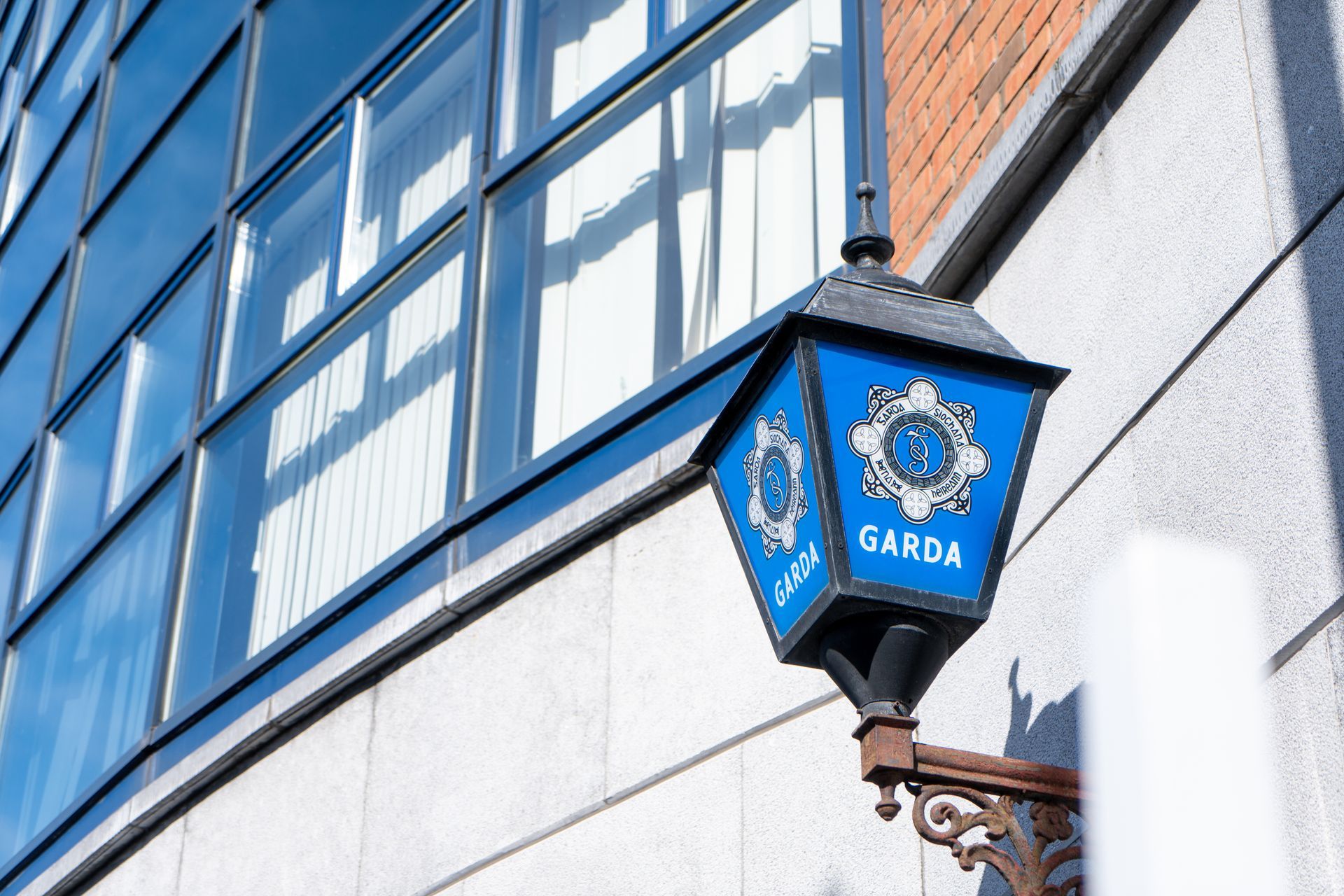mail: info@raftersolicitors.ie Emergency Contact Number: +353 (0)86 8764144

GARDA STATION INTERVIEW
Garda Station Detention
- Are you suspected of committing an offence? We can provide professional legal advice at any Garda Station 24 hours a Day 7 Days a week. Do not speak to the Gardai until you have spoken to us!
- We provide a nationwide Emergency Legal Advice Service for individuals detained for serious offences
- Remember, being detained does not necessarily mean you're guilty of a crime. It's a legal process, and you have rights that must be respected. If you feel your rights are being infringed upon or if you're unsure about anything phone our emergency number.
Your Rights
- If you are being detained in a Garda Station you have rights that legally have to be adhered to in your detetion.
- Anyone detained at a garda station is entitled to be represented by a solicitor of their choice. If you, a friend or a relative is being detained at a garda station contact us urgently so that we can assist.
- It is common the Gaurds will tell you to use the duty solicitor or the solicitor in the area. You are under no obligation to do this, you have the right to choose your own legal representation.
GARDA STATIONS FAQ
Q - I have been detained in a Garda Station, will the Gardaí provide me with a Solicitor?
It is understandable that you may be in shock or suprise at your arrest and are anxious as to whether a solicitor can attend the interview and provide you with advice.
Under Irish Law you have a right to 'reasonable access' to a solicitor of your choice. The term reasonable access essentially means that the Gardai will facilitate within reason contact with a solicitor however this is done so only upon your request.
Recent affirmation of your right to access a solicitor was given by the Irish Supreme Court in the 2014 case of People (DPP) v Gormley.
A number of positive developments have arisien from the Gormely judgement and your right to access a lawyer which are outlined below;
You have,
- an entitlement not to be interrogated after a request for a lawyer has been made and before that lawyer has become available to tender the requested advice”
- “the entitlement not to self-incriminate incorporates an entitlement to legal advice in advance of mandatory questioning of a suspect in custody.”
- “… [t]he right to a trial in due course of law encompasses a right to early access to a lawyer after arrest and the right not to be interrogated without
The Gormely judgement has been rubberstamped by a circular sent from the DPP (The Director of Public Prosecutions) which sets out that 'when requested' you must be given access to a solcitor both prior to the interview and during the interview.
The Gardaí will inform you of your right to a solicitor when reading your Notice of Rights in the Garda Station, they may or may not ask you if you wish to speak to a solicitor and once they have read to the Notice of Rights they have fufilled their duties under the Criminal Justice Act 198446 and the Treatment of Persons in Custody Regulations 1987.
Therefore, it is important to note that it is up to you to ask the Gardaí that you wish to speak to a solicitor and obtain legal advice.
Until you have spoken to your lawyer do not say anything to the Gardai.
Q - I do not have a solicitor, will the Gardaí recommend a solicitor for me upon my request?
If you do not know a solicitor to attend on your behalf and have requested to speak to a solicitor, the Gardai have an obligation to provide you with access to a solicitor.
Generally, the Gardaí may nominate a solicitor who pracitices in the area or alternativley you may be asked to choose a solicitor from a list of practitioners from the criminal legal aid panel.
It is important to be aware that you are legally entitled to a solicitor of your choice, and do not have to commit to a solicitor nominated by the Gardaí.
Q - I am not in a position to pay a solicitor, what can i do ?
The Garda Station Legal Advice Revised Scheme (“GLAS”) is the Statutory scheme which provides legal aid for persons detained in Garda Custody. The test for eligibility is based on your yearly finances.
If you are unemployed or if your earnings are below €20,316 per annum, you will be entitled to assistance from the GLAS scheme.
In order to apply, you simply complete a form with your Solicitor during your detention at the Garda Station. You do not need to apply to the scheme in advance of your detention.
Q - Will I be provided with an oppurtunity to speak with my solicitor before the interview starts ?
Remember, as mentioned in the previous answer the most important thing to do is to "request to speak to a solicitor".
Once you have requested to speak to a solcitor the Gardaí are obliged under law to provide you with access to your solicitor.
When you are detained you will initially be facilitated with a phonecall with your solicitor.
This phonecall is private and confidential and any advice given is priviledged which essentially means that the phonecall cannot be disclosed or indeed used against you during the course of your trial.
it is important that you set out basic personal details, the solicitor should have these already but just clarify upon his/her request.
- Your Name
- Your date of birth
- Your Age
- Whether you have ever been arrested
- Where were you arrested and who arrested you
- Contact details for your spouse/family member or freind
- Request whether the solicitor is in a position attend in person in the Station to provide you with representation
Your solicitor prior to speaking with should have obtained the following information about your arrest from the Member in Charge.
- name, title and contact details of the member of An Garda Síochána making contact
- name of the station
- name and address of the person detained
- statutory powers under which your detained
- time and location of arrest
- time at which the detainee arrived at the garda station ·
- name of investigating member(s)/member in charge ·
- nature of alleged offence
- Any disclosure that is made availible
- the current estimated duration of detention
- the current estimated duration of interview and potential number of interviews ·
- relevant detainee requirements (eg medical, translator, vulnerable)
Point to note - Ask your solicitor to attend in person prior to going into any detail - a phone conversation can be overhead and it is extremely important to have a consultation in private with your solicitor prior to the commencement of the interview
Q - The lenght of my detention, how long can the Gardaí detain me for?
The lenght of your detention is determined by the offence for which you are detained.
In Ireland, the most common detention is provided for under Section 4 of the Criminal Law Act 1997.
Section 4 provides as follows;
'Any offence for which a person of full age and capacity and not previously convicted may, under or by virtue of any enactment or the common law, be punished by imprisonment for a term of five years or by a more severe penalty and to an attempt to commit any such offence'
Therefore, your detention under section 4 is in relation to an alledged offence in order to be deemed valid needs to meet the following
- There must be a valid Arrest - Freeman v The DPP Carney J established that there must be a valid arrest to ground any detention.
- The offence for which your are arrested must carry an imprisonement of 5 years or more to ground your detention under section 4.
- You must be of Age - Section 4(7) of the Act 1984 sets out that full age means 'not below 12', there are additional safegaurds provided to children being detained by virtue of the Childrens Act 2001which is discussed in our juevinle section.
The other detention provisions provided under statue are as follows:
- Section 4 of the Criminal Justice Act 1984
- Section 42 of the Criminal Justice Act 1999
- Section 30 of the Offences Against the State Act 1939
- Section 2 of the Criminal Justice (Drug Trafficking) Act 1996
- Section 50 of the Criminal Justice Act 2007
- Sections 16 and 17 of the Criminal Procedure Act 2010
The below table gives a brief overview as to the lenght of time you may be detained under the various detention provisions
| Section 4 | Section 42 | Section 30 | Section 2 | Section 50 | |
|---|---|---|---|---|---|
| Initial Period | 6 HOURS | 6 HOURS | 24 HOURS | 6 HOURS | 6 HOURS |
| First Extension -Rank of Superintendant | 6 HOURS | 6 HOURS | 24 HOURS* - Autorised by Chief Superintendant | 18 HOURS * AUTORISED BY CHIEF SUPERINTENDANT ONLY | 18 HOURS |
| Second Extension- Rank of Chief Superintendant | 12 HOURS | 12 HOURS | 24 HOURS | 24 HOURS | |
| First Extension- Authorised by a District or Circuit Court Judge | 24 HOURS* - Application must be made by Chief Superintendant | 72 HOURS | 72 HOURS | ||
| Second Detention- Autorised by a District or Circuit Court Judge | 48 HOURS | 48 HOURS | |||
| Total Hours you May be detained | 24 HOURS | 24 HOURS | 3 DAYS I.E 72 HOURS | 7 DAYS I.E 168 HOURS | 7 DAYS I.E 168 HOURS |
DON'T FORGET
01
Do not speak to the Gardai until you have spoken to your solicitor
02
Ask for a private phone consultation with your solicitor
03
Request your solicitor to attend the Station
04
Do not provide any comment until you have spoken to your solicitor
SUMMARY OF PROCEDURE IN GARDA STATION INTERVIEWS
- Right to Legal Representation: Persons being interviewed at a Garda station have the right to consult with a solicitor (lawyer) prior to and during questioning. This right is guaranteed under the Irish Constitution and has been further reinforced by legal rulings and legislation.
- Audio and Video Recording: The Criminal Justice Act 1984 (as amended) requires that interviews conducted at Garda stations be audio and video recorded. This is to ensure transparency and accuracy in the recording of interviews and to safeguard the rights of the accused.
- Admissibility of Statements: Statements made during interviews at Garda stations may be used as evidence in criminal proceedings, subject to certain conditions. The admissibility of statements depends on factors such as voluntariness, compliance with legal procedures, and adherence to the rights of the accused.
- Cautions and Warnings: Prior to commencing an interview, the interviewing Gardaí (police officers) are required to caution the interviewee regarding their rights. This caution typically includes advising the individual of their right to remain silent and the consequences of failing to mention something they later rely on in court.
- Code of Practice for Detention, Treatment, and Questioning of Persons in Garda Custody: The Garda Síochána (Irish police force) operates under a Code of Practice for the detention, treatment, and questioning of persons in Garda custody. This code outlines procedures and standards to ensure the fair treatment of individuals detained for questioning.
- Access to Legal Advice and Assistance: Individuals being interviewed at Garda stations have the right to consult with a solicitor privately before and during questioning. The solicitor may advise the individual on their rights and provide assistance throughout the interview process.
- Review and Oversight: The operation of Garda stations, including the conduct of interviews, is subject to oversight by bodies such as the Garda Síochána Ombudsman Commission (GSOC) and the Policing Authority. These bodies ensure compliance with legal requirements and standards of conduct.
It's important to note that the laws and procedures regarding Garda station interviews may be subject to amendments and updates over time, so individuals involved in legal proceedings should seek advice from qualified legal professionals familiar with current legislation and practices.
Disclaimer
The information contained above is intended as a guide only and does not purport to be legal advice.
Independent and specific legal advice should be sought if you are detained in a Garda Station.
Book a Consultation
Sound legal advice is based on years of training, hard work, and passion, as well as familiarity with legislation and precedent and sound consideration. You’ll find all that and more at Rafter Solicitors.
Thank you for contacting us.
We will get back to you as soon as possible
If the matter is urgent please call our emergency number on 0868764144
Please try again later
About Us
Serving our clients with diligence, passion and hardwork

Contact Info
26 James Street, Co Kilkenny,
Ireland
Telephone: +353 (0)56 7800089
24 Hour Emergency: +353 (0)86 8764144
info@raftersolicitors.ie

